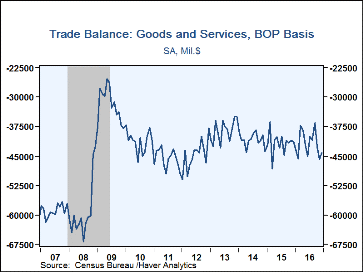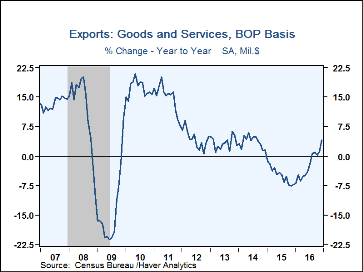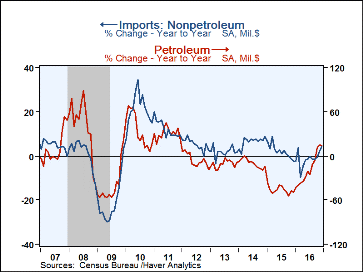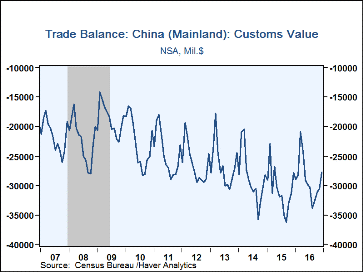 Global| Feb 07 2017
Global| Feb 07 2017U.S. Trade Deficit Declines
by:Tom Moeller
|in:Economy in Brief
Summary
The U.S. trade deficit in goods and services narrowed at year-end, but deepened slightly in all of last year. The December deficit fell to $44.3 billion from $45.7 billion during November, revised from $45.2 billion. A $45.0 billion [...]
The U.S. trade deficit in goods and services narrowed at year-end, but deepened slightly in all of last year. The December deficit fell to $44.3 billion from $45.7 billion during November, revised from $45.2 billion. A $45.0 billion deficit had been expected in the Action Economics Forecast Survey. For 2016, the deficit eased to $502.3 billion. Total exports increased 2.7% at yearend (4.2% y/y), following a 0.2% November slip. Exports for the year declined 2.3%. Overall imports gained 1.5% (4.6% y/y), but fell 1.8% for the full year. Lower petroleum imports accounted for the declines, with a 0.3% easing (+14.1% y/y), but were down 19.5% for the full year. Non-petroleum imports increased 2.2% in December (4.2 y/y), but declined 1.2% for the year.
Exports of goods jumped 4.1% (5.4% y/y) at yearend, driven by a 7.9% surge (3.0% y/y) in capital goods exports. Industrial supplies & materials exports increased 2.1% (11.3% y/y). The gain followed y/y declines through August. Exports of motor vehicles & parts improved 1.4% (0.1% y/y). Nonauto consumer goods exports gained 0.5% (-1.7% y/y), but food exports fell 0.9% (+7.6% y/y).
Services exports grew 0.4% (2.2% y/y), about the same as during the prior month. Travel exports grew 0.4% ( 2.9% y/y), and charges for intellectual property eased 0.1% (-2.9% y/y).
Imports of goods increased 1.9% (4.8% y/y), reflecting a 0.3% dip (+14.1% y/y) in petroleum imports. The quantity of petroleum imports fell 2.6% (-3.5% y/y), while the per barrel cost of crude oil rose slightly to $41.45. The value of non-petroleum imports increased 2.2% (4.2% y/y). Imports of autos & parts increased 5.5% (2.6% y/y) while the value of foods, feeds & beverages imports increased 1.4% (6.9% y/y). Consumer goods imports gained 0.3% (2.7% y/y).
Services imports were roughly unchanged (+3.7% y/y). Travel imports eased 0.1% (+6.5% y/y), while transport imports fell 0.4% (+2.2% y/y).
By country, the trade deficit with China fell to $27.8 billion in December from $30.5 billion the month before. U.S. exports to China fell 4.1% m/m (+14.9% y/y), while imports declined 7.6% (+3.6% y/y). The trade deficit with Japan deepened to $6.5 billion. Exports rose 4.1% (19.0% y/y), while imports increased 7.6% (7.8% y/y). The trade deficit with the European Union (EU-28) narrowed to $12.2 billion as exports increased 10.1% (5.4% y/y) and imports decreased 1.2% (-0.8% y/y). These country data are not seasonally adjusted.
The international trade data can be found in Haver's USECON database. Detailed figures are available in the USINT database. The expectations figures are from the Action Economics Forecast Survey, which is carried in the AS1REPNA.
| Foreign Trade in Goods & Services (Current Dollars) | Dec | Nov | Oct | Y/Y | 2016 | 2015 | 2014 |
|---|---|---|---|---|---|---|---|
| U.S. Trade Deficit | $44.3 bil. | $45.7 bil. | $42.7 bil. | $41.5 bil. (12/15) |
$502.3 bil. | $500.4 bil. | $490.2 bil. |
| Exports of Goods & Services (% Chg) | 2.7 | -0.2 | -1.8 | 4.2 | -2.3 | -4.9 | 3.6 |
| Imports of Goods & Services (% Chg) | 1.5 | 1.2 | 1.2 | 4.6 | -1.8 | -3.7 | 4.0 |
| Petroleum (% Chg) | -0.3 | 7.7 | 2.5 | 14.1 | -19.5 | -45.5 | -9.6 |
| Nonpetroleum Goods (% Chg) | 2.2 | 0.9 | 1.3 | 4.2 | -1.2 | 2.2 | 6.5 |
Tom Moeller
AuthorMore in Author Profile »Prior to joining Haver Analytics in 2000, Mr. Moeller worked as the Economist at Chancellor Capital Management from 1985 to 1999. There, he developed comprehensive economic forecasts and interpreted economic data for equity and fixed income portfolio managers. Also at Chancellor, Mr. Moeller worked as an equity analyst and was responsible for researching and rating companies in the economically sensitive automobile and housing industries for investment in Chancellor’s equity portfolio. Prior to joining Chancellor, Mr. Moeller was an Economist at Citibank from 1979 to 1984. He also analyzed pricing behavior in the metals industry for the Council on Wage and Price Stability in Washington, D.C. In 1999, Mr. Moeller received the award for most accurate forecast from the Forecasters' Club of New York. From 1990 to 1992 he was President of the New York Association for Business Economists. Mr. Moeller earned an M.B.A. in Finance from Fordham University, where he graduated in 1987. He holds a Bachelor of Arts in Economics from George Washington University.
More Economy in Brief
 Global| Feb 05 2026
Global| Feb 05 2026Charts of the Week: Balanced Policy, Resilient Data and AI Narratives
by:Andrew Cates










